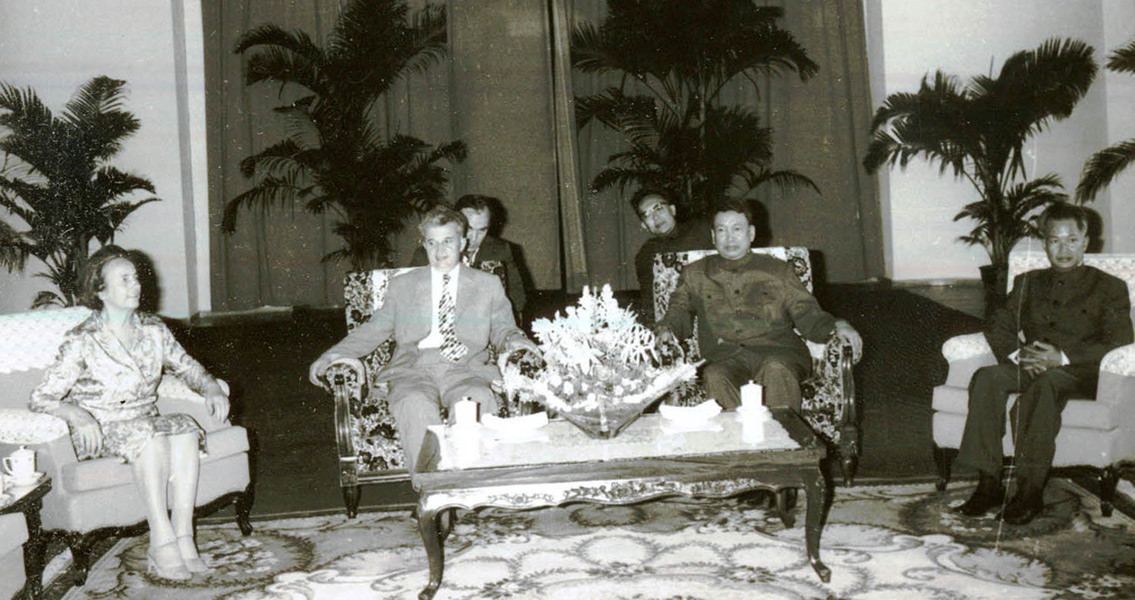<![CDATA[On 15th April 1998, Pol Pot died of heart failure while under house arrest in Cambodia. Aged 73, Pol Pot had spent the last years of his life serving a life sentence imposed by the Khmer Rouge, the organisation he had led in the 1970s. Named Saloth Sar by his parents, Pol Pot was born in 1925 in the small village of Prek Sbauv, located roughly 100 miles north of the Cambodian capital, Phnom Penh. His family were comparatively affluent agriculturists, owning 50 acres of rice paddy. In 1934, Pol Pot was sent to Phnom Penh where he spent a year studying at a Buddhist monastery before beginning his education at a Catholic primary school. In 1949 he won a scholarship to study radio technology in Paris, France. His time in Europe saw him make his first connections with communist ideas. Pot returned to Cambodia in 1953, just as the region started the revolution which ultimately led to independence from French rule. Pol Pot joined the Khmer People's Revolutionary Party (KPRP), a communist political party which had been set up with support from the North Vietnamese. At this point, Pol Pot found employment as a private teacher, while also secretly plotting a communist revolution with the other members of the KPRP. A 1963 clampdown on communist activity by the Cambodian government forced the KPRP to go into hiding in the Cambodian jungle. During these years of hiding, Pol Pot became increasingly prominent in the party, eventually becoming its leader. This period also saw Pol Pot oversee the creation of the Khmer Rouge, a guerrilla military wing of the KPRP. The Khmer Rouge revolution started in 1968 with a national uprising. Progress was initially slow, but by 1970 the Khmer Rouge had established control over roughly a third of Cambodia. The key turning point in the revolution came in 1973, when the U.S. airforce began a bombing campaign against North Vietnamese forces in Cambodian territory. The North Vietnamese, who had significant influence in Cambodia, were forced to flee the country. Resentment of the U.S. attacks on Cambodian soil saw membership of the Khmer Rouge guerrilla army increase dramatically. This, combined with the destabilising effect of the North Vietnamese retreat, allowed the Khmer Rouge to capture Phnom Penh in 1975 and establish a new regime, the Kampuchean People's Republic. Pol Pot's government was influenced by the communist principles being applied in China and the USSR, but applied them to unprecedented, tragic extremes. The Kampuchean People's Republic swiftly became a sickening case study in the consequences of ruthlessly pursuing economic and social ideology with no concern for the human costs. The regime aimed to purify Cambodia of Western influence and create an agrarian utopia. Calendars were reset to Year Zero, while money and private property were abolished. All cities and towns were evacuated, with the inhabitants forced to work in agricultural communities. Anyone believed to be an intellectual (doctors, lawyers etc) was either killed or stripped of all rank and possession and made to work as farm labourers as a means of 're-education'. Minority ethnic groups were especially persecuted by the new regime. The Khmer Rouge sought to create a pure Cambodian society. Chinese, Muslim Chans, Vietnamese and Thai citizens who had lived in Cambodia for generations were banned from speaking their native languages or exhibiting any foreign traits. Brutal pogroms were carried out against these communities, with up to a half of the Muslim Chans in Cambodia being killed during Pot's reign. In 1978, an invasion of Cambodia by Vietnamese troops brought the Khmer Rouge to an end. A moderate Communist government was established in 1979, and Pol Pot and the Khmer Rouge were forced to retreat into hiding in the jungle. Pol Pot officially retired in 1985, but the Khmer Rouge continued to launch a guerrilla campaign against the new government in Phnom Penh. Pol Pot was eventually put on trial by the Khmer Rouge, and sentenced to life imprisonment following a 'people's tribunal' in 1997. At the time of his death, the Cambodian Government Army were encircling Khmer Rouge forces in Cambodia's jungle, forcing them and the increasingly fragile Pol Pot to retreat farther into the wilderness. Pol Pot's regime is accused with causing the deaths of over two million people, either directly through execution and torture, or as a result of disease and starvation caused by the radical attempts at reshaping society. His prolonged house arrest by the Khmer Rouge meant he was never extradited to stand trial for crimes against humanity. Image courtesy of Wikimedia Commons user: Romanian Communism Online Photo Collection ]]>
The Death of Pol Pot
